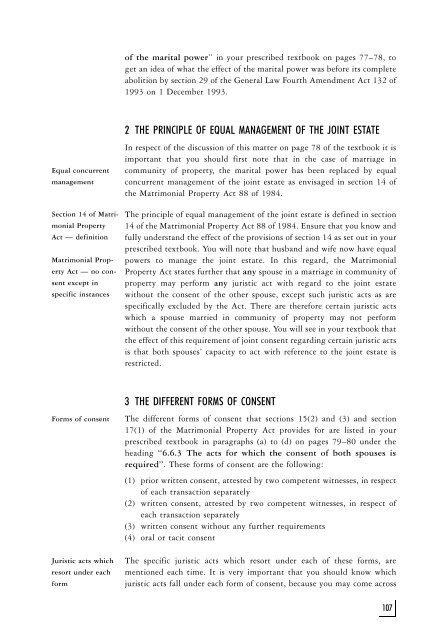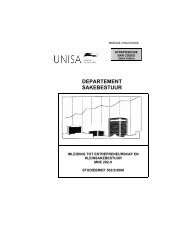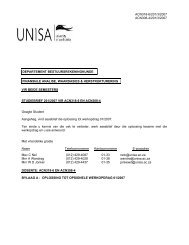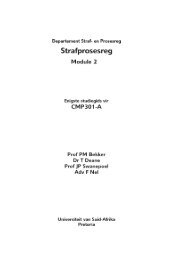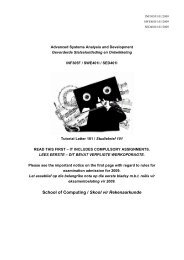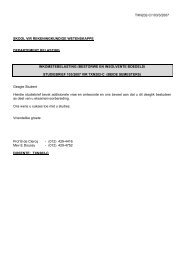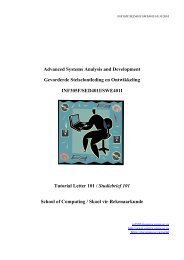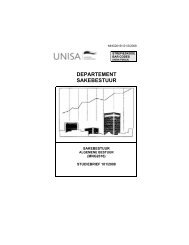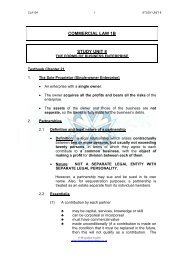key to the study guide - Name
key to the study guide - Name
key to the study guide - Name
You also want an ePaper? Increase the reach of your titles
YUMPU automatically turns print PDFs into web optimized ePapers that Google loves.
Equal concurrent<br />
management<br />
Section 14 of Matrimonial<br />
Property<br />
Act Ð definition<br />
Matrimonial Property<br />
Act Ð no consent<br />
except in<br />
specific instances<br />
of <strong>the</strong> marital power'' in your prescribed textbook on pages 77±78, <strong>to</strong><br />
get an idea of what <strong>the</strong> effect of <strong>the</strong> marital power was before its complete<br />
abolition by section 29 of <strong>the</strong> General Law Fourth Amendment Act 132 of<br />
1993 on 1 December 1993.<br />
2 THE PRINCIPLE OF EQUAL MANAGEMENT OF THE JOINT ESTATE<br />
In respect of <strong>the</strong> discussion of this matter on page 78 of <strong>the</strong> textbook it is<br />
important that you should first note that in <strong>the</strong> case of marriage in<br />
community of property, <strong>the</strong> marital power has been replaced by equal<br />
concurrent management of <strong>the</strong> joint estate as envisaged in section 14 of<br />
<strong>the</strong> Matrimonial Property Act 88 of 1984.<br />
The principle of equal management of <strong>the</strong> joint estate is defined in section<br />
14 of <strong>the</strong> Matrimonial Property Act 88 of 1984. Ensure that you know and<br />
fully understand <strong>the</strong> effect of <strong>the</strong> provisions of section 14 as set out in your<br />
prescribed textbook. You will note that husband and wife now have equal<br />
powers <strong>to</strong> manage <strong>the</strong> joint estate. In this regard, <strong>the</strong> Matrimonial<br />
Property Act states fur<strong>the</strong>r that any spouse in a marriage in community of<br />
property may perform any juristic act with regard <strong>to</strong> <strong>the</strong> joint estate<br />
without <strong>the</strong> consent of <strong>the</strong> o<strong>the</strong>r spouse, except such juristic acts as are<br />
specifically excluded by <strong>the</strong> Act. There are <strong>the</strong>refore certain juristic acts<br />
which a spouse married in community of property may not perform<br />
without <strong>the</strong> consent of <strong>the</strong> o<strong>the</strong>r spouse. You will see in your textbook that<br />
<strong>the</strong> effect of this requirement of joint consent regarding certain juristic acts<br />
is that both spouses' capacity <strong>to</strong> act with reference <strong>to</strong> <strong>the</strong> joint estate is<br />
restricted.<br />
3 THE DIFFERENT FORMS OF CONSENT<br />
Forms of consent The different forms of consent that sections 15(2) and (3) and section<br />
17(1) of <strong>the</strong> Matrimonial Property Act provides for are listed in your<br />
prescribed textbook in paragraphs (a) <strong>to</strong> (d) on pages 79±80 under <strong>the</strong><br />
heading ``6.6.3 The acts for which <strong>the</strong> consent of both spouses is<br />
required''. These forms of consent are <strong>the</strong> following:<br />
Juristic acts which<br />
resort under each<br />
form<br />
(1) prior written consent, attested by two competent witnesses, in respect<br />
of each transaction separately<br />
(2) written consent, attested by two competent witnesses, in respect of<br />
each transaction separately<br />
(3) written consent without any fur<strong>the</strong>r requirements<br />
(4) oral or tacit consent<br />
The specific juristic acts which resort under each of <strong>the</strong>se forms, are<br />
mentioned each time. It is very important that you should know which<br />
juristic acts fall under each form of consent, because you may come across<br />
107


